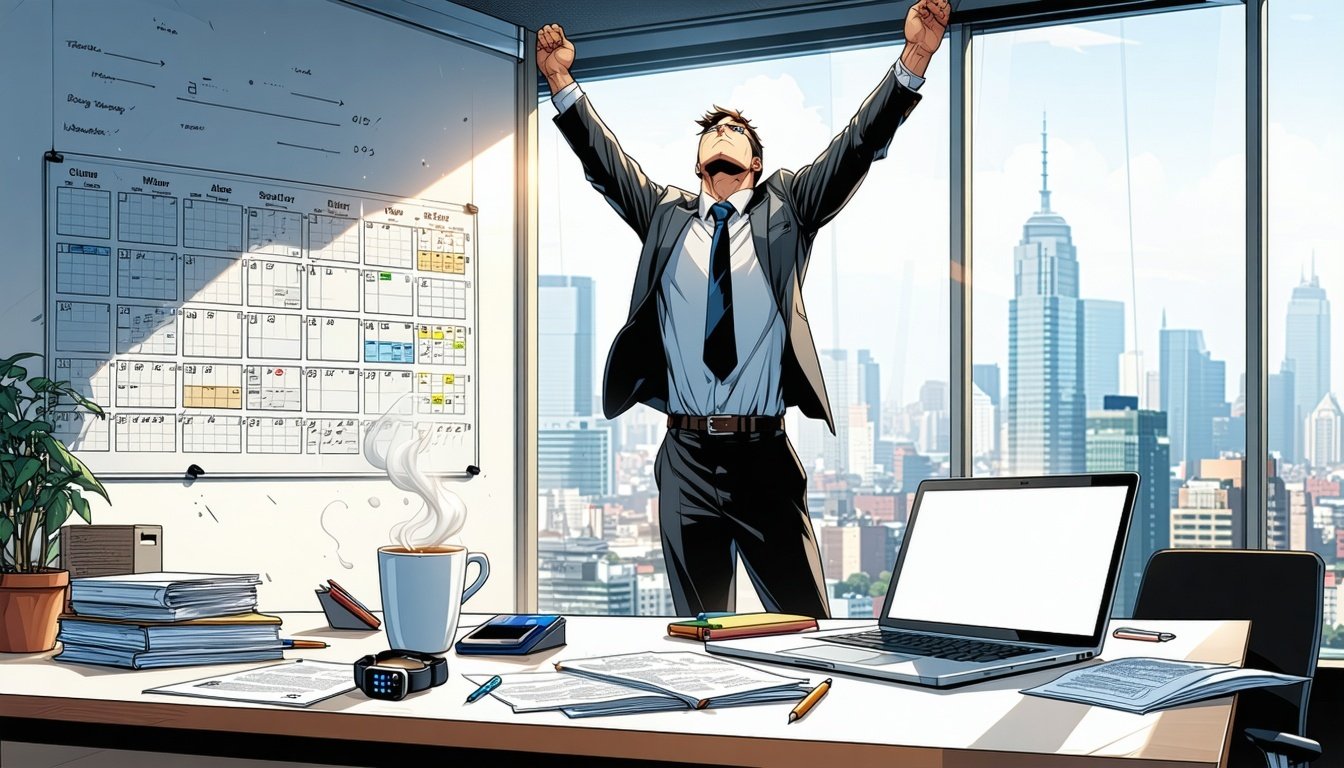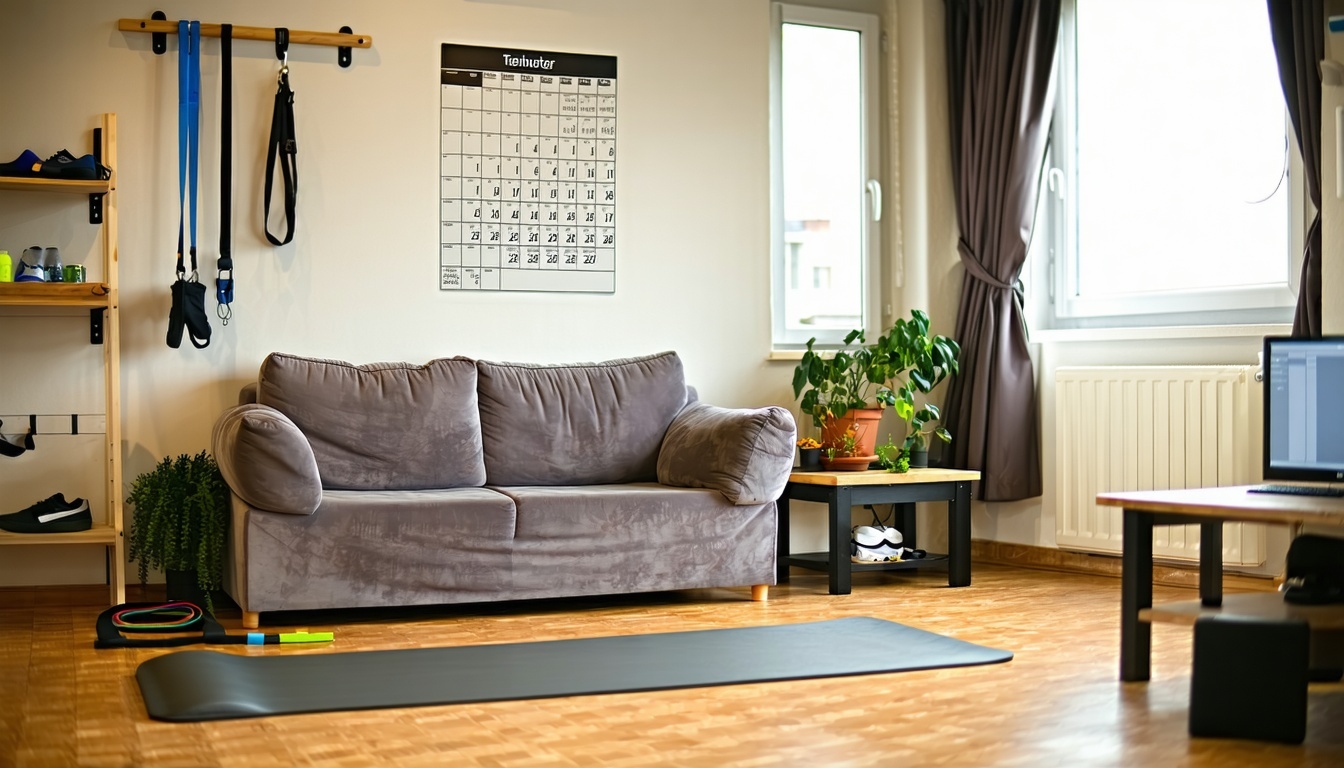The Complete Guide to Staying Fit as a Busy Professional: Solutions for Every Challenge
Quick Answer
Staying fit as a busy professional requires strategic micro-workouts, environment adaptation, and energy management. Focus on 7-15 minute routines that fit your schedule, use your existing space creatively, and choose exercises that boost rather than drain your professional energy. The key is consistency over intensity, with specific solutions for every common challenge.
The Professional Fitness Challenge: Why Traditional Advice Fails
Let's be honest: most fitness advice is written by people who've never tried to squeeze a workout between back-to-back client calls or attempted burpees in a hotel room at 11 PM after a 14-hour workday.
The fitness industry loves to preach about "making time" and "prioritizing health," but they're missing the point entirely. You're not lazy or unmotivated—you're dealing with constraints that traditional fitness approaches simply don't address.
Here's what makes professional fitness different:
- Time Scarcity: Your schedule is packed with meetings, deadlines, and unexpected crises
- Space Limitations: You're often in offices, hotels, cars, or tiny apartments
- Energy Management: You need fitness that energizes rather than exhausts
- Professional Appearance: Sweating through your suit isn't an option
- Unpredictable Schedules: Your routine changes daily based on work demands
This guide addresses these real-world constraints with practical, tested solutions that actually work for demanding careers.
The Complete Solution Framework
Professional fitness success requires a systematic approach that adapts to your specific constraints rather than fighting against them. Here's the framework that transforms busy professionals from fitness strugglers to consistent achievers:
1. Constraint-Based Planning
Instead of forcing yourself into a rigid routine, identify your specific limitations and build around them:
- Time Assessment: Map your actual available windows (not ideal scenarios)
- Space Evaluation: Catalog your real workout environments
- Energy Patterns: Track when you naturally have more or less energy
- Schedule Variability: Plan for both routine and chaotic days
2. Micro-Workout Integration
The secret isn't finding more time—it's using existing time more effectively:
- Transition Workouts: Exercise during natural breaks between activities
- Habit Stacking: Attach movement to existing routines
- Productive Procrastination: Use exercise as a mental break that actually helps work
- Meeting Movement: Integrate activity into your professional responsibilities
3. Environment Optimization
Every space becomes a potential gym with the right approach:
- Office Adaptation: Desk exercises, stairwell workouts, bathroom privacy
- Travel Solutions: Hotel rooms, airports, cars, and client sites
- Home Efficiency: Maximum results in minimal space
- Public Spaces: Parks, sidewalks, and building lobbies
4. Energy-First Approach
Professional fitness should enhance your work performance, not hinder it:
- Energizing Movements: Exercises that boost alertness and focus
- Stress Relief: Physical activities that process work tension
- Recovery Acceleration: Movement that helps you bounce back faster
- Sleep Optimization: Exercise timing that improves rest quality
Time-Specific Solutions: Making Every Minute Count
Time is your most precious resource, and these solutions maximize every available minute:
Ultra-Short Workouts (2-7 Minutes)
Perfect for the busiest days when even 10 minutes feels impossible:
- The 7-Minute Pre-Meeting Energy Boost: Transform nervous energy into focused power before important meetings
- The 3-Minute Desk Reset: Combat call fatigue and re-energize between back-to-back virtual meetings
- The 2-Minute Morning Motivation Primer: Set yourself up for exercise success later in the day
Lunch Break Optimization (15-30 Minutes)
Your lunch break is prime fitness real estate—here's how to use it without derailing your afternoon:
- Sweat-Free Lunch Workouts: Stay professional while staying active
- Walking Meeting Strategies: Turn necessary conversations into movement opportunities
- Stairwell Circuits: Use your building's architecture for cardio
Post-Work Recovery (15-45 Minutes)
When you're drained from work but know you need to move:
- The 15-Minute Decompression Routine: Process work stress while rebuilding energy
- Exhaustion-Proof Exercise: How to move when you feel completely drained
Extreme Time Constraints
For those weeks when work completely takes over:
- The 60+ Hour Work Week Survival Guide: Maintain fitness during your most demanding periods
- Minimum Effective Dose Workouts: The absolute least you can do while still getting benefits
Space-Specific Solutions: Fitness Anywhere
Your workout space doesn't need to be perfect—it just needs to be available. Here's how to exercise effectively in any environment:
Office and Workplace Fitness
Your office is actually a well-equipped gym in disguise:
- Standing Desk Workouts: Professional-looking exercises for open offices
- Ultimate Privacy Workouts: Bathroom exercises for complete discretion
- Conference Room Circuits: Use empty meeting rooms for quick sessions
- Parking Garage Cardio: Stair climbing and walking in covered areas
Travel and Hotel Fitness
Business travel doesn't have to derail your fitness routine:
- Silent Hotel Room Workouts: Effective routines that won't disturb neighbors
- Car Exercise Strategies: Stay active during long drives and commutes
- Airport Movement: Turn travel delays into fitness opportunities
Small Space Solutions
Limited space doesn't mean limited results:
- Tiny Apartment Fitness: Maximum results in minimum space
- Vertical Workouts: Use wall space when floor space is limited
- Furniture-Based Exercise: Turn your existing furniture into gym equipment
Energy and Motivation Solutions: Sustainable Fitness Psychology
The mental game of professional fitness is often harder than the physical challenge:
Motivation and Habit Building
- Morning Motivation Primers: Start your day with exercise momentum
- Energy-First Exercise: Choose movements that give you energy rather than drain it
- Habit Stacking: Attach exercise to existing professional routines
Managing Low Energy and Fatigue
- Exhaustion-Proof Strategies: Move when you feel like you can't
- Chronic Fatigue Adaptations: Fitness approaches for ongoing energy challenges
- Seasonal Motivation Strategies: Maintain routines during difficult mental health periods
Stress and Recovery Management
- Exercise as Stress Processing: Use movement to metabolize work tension
- Recovery Acceleration: Workouts that help you bounce back faster
- Sleep Optimization: Exercise timing for better rest quality
The Implementation Roadmap: Getting Started
Week 1: Assessment and Planning
Day 1-2: Constraint Mapping
- Track your actual schedule for 2 days (not your ideal schedule)
- Identify 3-5 minute windows throughout each day
- Note your energy levels at different times
- List all available spaces (office, home, travel locations)
Day 3-4: Solution Selection
- Choose 2-3 specific workout solutions that match your constraints
- Start with the easiest options to build confidence
- Plan backup options for chaotic days
Day 5-7: Initial Testing
- Try each selected workout once
- Note what works and what doesn't
- Adjust timing and location as needed
Week 2: Habit Formation
Focus on Consistency Over Intensity
- Aim for movement every day, even if just 2 minutes
- Attach exercise to existing habits (after coffee, before lunch, etc.)
- Track completion, not performance
- Celebrate small wins
Week 3-4: Optimization and Expansion
Refine Your Approach
- Increase duration or intensity of successful routines
- Add variety to prevent boredom
- Develop solutions for different scenarios (busy days, travel, etc.)
- Create accountability systems
Month 2 and Beyond: Advanced Strategies
Build a Comprehensive System
- Develop seasonal adaptations
- Create travel-specific routines
- Integrate advanced techniques
- Mentor other busy professionals
Frequently Asked Questions
How can I stay fit with a 60+ hour work week?
Focus on micro-workouts throughout the day rather than trying to find large blocks of time. Even 2-3 minutes of movement every hour adds up to significant health benefits. Utilize transition times between activities, turn phone calls into walking meetings, and use bathroom breaks for quick stretches. The key is consistency over intensity—our complete survival guide shows exactly how to maintain fitness during your most demanding periods.
What exercises can I do in business attire?
Wall push-ups, calf raises, desk squats, seated spinal twists, shoulder rolls, and isometric exercises work perfectly in professional clothing. These movements avoid excessive sweating, don't wrinkle clothes, and can be done quietly in office environments. Our standing desk workout guide provides specific routines that look professional while delivering real fitness benefits.
How do I exercise when I'm too tired after work?
Start with energizing movements rather than exhausting workouts. Try 2-3 minutes of light stretching, gentle movement, or breathing exercises to boost energy before attempting more intensive exercise. Often, the hardest part is starting—once you begin moving, energy naturally increases. Our exhaustion-proof strategies provide specific techniques for overcoming post-work fatigue.
Can I get fit without going to a gym?
Absolutely. Bodyweight exercises, desk workouts, stair climbing, walking meetings, and home routines can provide complete fitness without gym membership or equipment. Many busy professionals find home and office workouts more convenient and sustainable than gym visits. Our small space fitness guide shows how to achieve maximum results in minimal space.
What's the minimum exercise needed for health benefits?
As little as 7-10 minutes of daily movement can provide measurable health benefits, including improved energy, better mood, enhanced focus, and reduced stress. The key is consistency rather than intensity for busy professionals. Our minimum effective dose approach shows exactly how to get meaningful results with minimal time investment.
How do I stay motivated to exercise with a demanding job?
Link exercise to immediate professional benefits like increased energy, better focus, improved stress management, and enhanced work performance. Start with 2-minute routines to build the habit before increasing duration. Track how exercise affects your work performance rather than just physical metrics. Our motivation primer system helps establish sustainable exercise habits that support your career.
What if my office doesn't have fitness facilities?
Use your existing environment creatively: stairs for cardio, desk for support exercises, bathroom for privacy, and hallways for walking. Most office buildings have everything you need for effective workouts—you just need to see the possibilities. Our office workout strategies show how to turn any workplace into a fitness opportunity.
How can I exercise while traveling for business?
Hotel room workouts, airport walking, car exercises during long drives, and bodyweight routines require no equipment and work in any location. Business travel can actually provide unique fitness opportunities with different environments and schedules. Our travel fitness guide ensures you stay active regardless of your location.
Is it worth exercising if I only have 5 minutes?
Yes! Five minutes of movement is infinitely better than zero minutes. Short bursts throughout the day accumulate significant health benefits and energy improvements. Many busy professionals find that 5-minute workouts are more sustainable than trying to find 30-60 minute blocks. Our micro-workout strategies show how to maximize these brief exercise windows.
How do I exercise without disturbing coworkers?
Focus on quiet, controlled movements like stretches, isometric exercises, and subtle desk exercises. Many effective exercises appear like normal workplace activities—stretching, adjusting posture, or taking thinking breaks. Our professional workout guide provides specific routines that blend seamlessly into office environments.
Advanced Strategies for Long-Term Success
Seasonal Adaptations
Your fitness approach should evolve with the calendar:
- Winter Strategies: Indoor focus, energy management during dark months
- Spring Renewal: Outdoor integration, routine refreshing
- Summer Adjustments: Heat management, vacation planning
- Fall Preparation: Habit reinforcement before busy season
Career Stage Considerations
Different career phases require different approaches:
- Early Career: Building habits while establishing professional identity
- Mid-Career: Managing increased responsibilities and family demands
- Senior Leadership: Modeling healthy behavior while managing extreme demands
- Career Transitions: Maintaining fitness during job changes and uncertainty
Technology Integration
Use technology to enhance rather than complicate your fitness:
- Calendar Integration: Schedule movement like any other important meeting
- Reminder Systems: Automated prompts for movement breaks
- Progress Tracking: Simple metrics that motivate without overwhelming
- Virtual Accountability: Connect with other busy professionals for support
Building Your Professional Fitness Community
Workplace Wellness Leadership
Become the catalyst for healthier workplace culture:
- Walking Meetings: Introduce movement into team interactions
- Stretch Breaks: Lead brief movement sessions during long meetings
- Wellness Challenges: Organize team-based fitness initiatives
- Resource Sharing: Help colleagues discover their own fitness solutions
Professional Network Fitness
Integrate fitness into your professional relationships:
- Active Networking: Suggest walking meetings or active social events
- Conference Fitness: Maintain routines during business travel and events
- Mentorship Integration: Include wellness discussions in professional development
Measuring Success: Beyond the Scale
Professional Performance Metrics
Track how fitness impacts your work:
- Energy Levels: Rate your energy throughout the workday
- Focus Quality: Notice improvements in concentration and decision-making
- Stress Management: Monitor how exercise affects your stress response
- Sleep Quality: Track how movement impacts your rest and recovery
Consistency Tracking
Focus on habit formation over performance:
- Movement Frequency: Days per week with any physical activity
- Routine Adherence: Consistency with your chosen strategies
- Adaptation Success: How well you handle schedule disruptions
- Long-term Sustainability: Maintenance over months and years
Troubleshooting Common Challenges
Schedule Disruptions
When your routine gets derailed:
- Emergency Protocols: 2-minute backup routines for chaotic days
- Travel Adaptations: Portable solutions that work anywhere
- Crisis Management: Maintaining some movement during work emergencies
- Recovery Strategies: Getting back on track after disruptions
Motivation Fluctuations
When enthusiasm wanes:
- Minimum Viable Routines: The absolute least you can do to maintain momentum
- Variety Integration: Preventing boredom without overcomplicating
- Professional Benefits Focus: Remembering why fitness supports your career
- Support System Activation: When and how to seek help
The Future of Professional Fitness
Workplace Evolution
How changing work environments affect fitness:
- Remote Work Opportunities: Leveraging home-based flexibility
- Hybrid Schedule Optimization: Different strategies for office vs. home days
- Technology Integration: Using new tools without becoming dependent
- Wellness Culture Shifts: Leading positive change in professional environments
Personal Development Integration
Connecting fitness to broader professional growth:
- Leadership Development: How physical wellness enhances leadership capacity
- Resilience Building: Using fitness to develop mental toughness
- Performance Optimization: Treating your body like a high-performance asset
- Legacy Creation: Modeling sustainable success for others
Your Next Steps: From Reading to Doing
Knowledge without action is just entertainment. Here's how to transform this information into real change:
This Week
- Choose One Solution: Pick the strategy that best matches your biggest constraint
- Start Small: Commit to just 2-3 minutes daily for the first week
- Track Completion: Note when you do it, not how well you do it
- Adjust as Needed: Modify timing, location, or exercises based on what you learn
This Month
- Build Consistency: Aim for movement 5-6 days per week
- Add Variety: Incorporate 2-3 different solutions to prevent boredom
- Notice Benefits: Pay attention to how exercise affects your work performance
- Plan for Disruptions: Develop backup strategies for busy periods
This Quarter
- Expand Your System: Add solutions for different scenarios (travel, busy periods, etc.)
- Optimize Performance: Increase duration or intensity of successful routines
- Share Your Success: Help colleagues discover their own fitness solutions
- Plan for Sustainability: Develop long-term strategies that evolve with your career
Related Fitness Solutions
Explore specific solutions for your unique challenges:
Time-Specific Strategies
- 7-Minute Pre-Meeting Energy Boost
- 3-Minute Desk Reset Between Calls
- Sweat-Free Lunch Break Workouts
- 15-Minute Post-Work Decompression
- 60+ Hour Work Week Survival Guide
Space-Specific Solutions
- Silent Hotel Room Workouts
- Car Exercises for Long Commutes
- Tiny Apartment Fitness Solutions
- Private Office Bathroom Workouts
- Professional Standing Desk Exercises
Energy and Motivation Support
- Exercise When Completely Exhausted
- 2-Minute Morning Motivation Primer
- Minimum Effective Dose for Zero Motivation
- Seasonal Depression Workout Strategies
- Chronic Fatigue Exercise Adaptations
Conclusion: Your Professional Fitness Revolution Starts Now
The traditional fitness industry has failed busy professionals by ignoring the realities of demanding careers. This guide changes that by providing practical, tested solutions that work within your constraints rather than against them.
You don't need more time, better equipment, or perfect conditions. You need strategies that fit your real life, not your ideal life. You need approaches that energize rather than exhaust, that integrate rather than compete with your professional responsibilities.
The professionals who thrive in demanding careers aren't the ones who somehow find more hours in the day—they're the ones who use the time they have more strategically. They understand that fitness isn't separate from professional success; it's fundamental to it.
Your body is your most important professional asset. It carries you through long days, stressful meetings, and challenging projects. It deserves the same strategic attention you give to your career development, financial planning, and professional relationships.
The question isn't whether you have time for fitness. The question is whether you can afford not to prioritize it. Every day you delay is another day of decreased energy, reduced focus, and increased stress—all of which directly impact your professional performance.
Start today. Start small. Start with just one solution from this guide. Your future self—both personally and professionally—will thank you for taking this first step toward sustainable, strategic fitness that actually fits your life.
The revolution in professional fitness begins with professionals like you who refuse to accept that demanding careers and physical wellness are mutually exclusive. You have everything you need to succeed. Now it's time to prove it.






